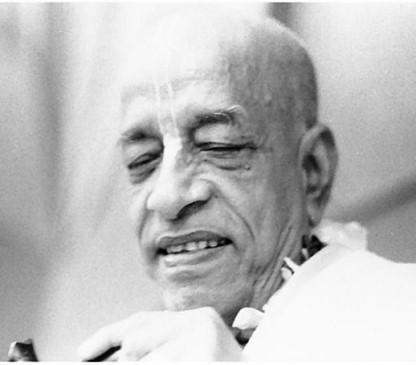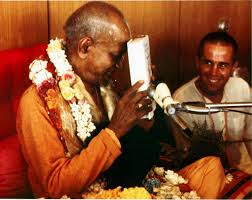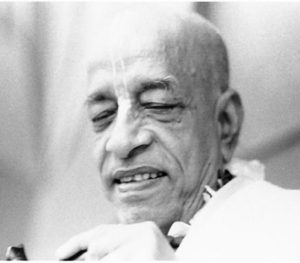
Submitted by: Yasoda nandana Dasa
Srila Prabhupāda’s instructions on editing are in his books themselves
12. March 2014 by Prabhupada News


Srila Prabhupāda’s instructions on editing are in his books themselves
In this article we hope to bring to light how Srila Prabhupāda, the Acharya and Jagat Guru, has personally instructed the proper etiquette to all his followers in how to deal with seeming mistakes, or errors in the writings of an uttama-adhikārī and Acharya.
In this time of confusion and controversy, in regard to the editing of the BBTI, we humbly submit the following at the feet of all the Vaiṣṇava’s for their own contemplation and realization in spiritual life:
In the Caitanya-caritāmṛita, Madhya-līlā 9.358, Srila Prabhupāda cites his spiritual master Śrīla Bhaktisiddhānta Sarasvatī Ṭhākura, who points out that in the seventy-fourth verse of this same chapter there is an apparent error made by Kṛṣṇa dāsa, Kavirāja Gosvāmī. Srila Prabhupāda, just to teach us the principle of arsa-prayoga, [please see quotes from Srila Prabhupāda on “arsha-prayoga” at the end of this article] does not touch the words of Kṛṣṇadāsa Kaviraja Goswami, but leaves this apparent error as it is, out of respect for the transcendental book. Even though Srila Prabhupāda’s own spiritual master, the most pure and intimate confidential devotee and associate of Lord Kṛṣṇa and Sri Caitanya Mahāprabhu himself, had clearly pointed out that this is an apparent error and is apparently wrong.
Furthermore in the purport to that seventy-fourth verse, mentioned above, Srila Prabhupada mentions nothing; only at the end of the chapter, after Srila Kṛṣṇadāsa Kaviraja concludes his narration, does Srila Prabhupāda even mention the apparent mistake.
That Caitanya-caritāmṛita, Madhya-līlā 9. 358 purport is cited here for your reference:
“Śrīla Bhaktisiddhānta Sarasvatī Ṭhākura points out that in the seventy-fourth verse of this chapter it is stated that Śrī Caitanya Mahāprabhu visited the temple of Śiyālī-bhairavī, but actually at Śiyālī, Śrī Caitanya Mahāprabhu visited the temple of Śrī Bhū-varāha. Near Śiyālī and Cidambaram there is a temple known as Śrī Muṣṇam. In this temple there is a Deity of Śrī Bhū-varāha. In the jurisdiction of Cidambaram there is a district known as southern Arcot. The town of Śiyālī is in that district. There is a temple of Śrī Bhū-varāhadeva nearby, not Bhairavī-devī. This is Śrīla Bhaktisiddhānta Sarasvatī Ṭhākura’s conclusion.”
This is a very good lesson to make a clear and prominent note of how Srila Prabhupāda, the teacher by example, has chosen to edit (or rather not edit) the words of the spiritual masters or previous acharyas’ writings.
Srila Prabhupāda has every right in the world to change or edit anything, for he is Kṛṣṇa’s direct representative and the present acharya and current link to the paramparā. But, as the Acharya, he has himself stuck to the principal of arsha-prayoga and did not changed it just to teach us respect, correct behaviour. He does not touch this apparent “mistake,” he leaves it completely untouched, as it is.
As Srila Prabhupāda said “I have instructed everything in my books.” (Letter to: Dina Dayala, Mayapur, 25 February, 1976) So Srila Prabhupāda has also instructed us to not edit the books in his books themselves.
There are many instances of this in Srila Prabhupāda’s writings if we just look.
We will cite another place were Srila Prabhupāda left a seeming mistake as it is, even though it may be considered “wrong.”
We will cite another place were Srila Prabhupāda left a seeming mistake as it is, even though it may be considered “wrong.”
“Ambikāvana is situated somewhere in the Gujarat province. Ambikāvana is said to be situated on the river Sarasvatī, yet we do not find any Sarasvatī River in the Gujarat province; the only river there is Savarmati. In India, all the big places of pilgrimage are situated on nice rivers like the Ganges, Yamunā, Sarasvatī, Narmadā, Godāvarī, Kāverī, etc. Ambikāvana was situated on the bank of Sarasvatī, and all the cowherd men and Nanda Mahārāja went there.”
(KRSNA Book 1970 edition Volume 1 Chapter 33 / Vidyādhara Liberated and the Demon Śaṅkhāsura Killed)
In this quote from Srila Prabhupāda’s original KRSNA book, Prabhupāda mentions that although it says, “Ambikāvana is said to be situated on the river Sarasvatī, yet we do not find any Sarasvatī River in the Gujarat province…” Prabhupāda does not change the text to correct the seeming mistake.
Below is another example of something that may be considered from the scholarly or mundane viewpoint “wrong” with the text but it was left as it is out of respect for the author, adhering to the principle of arsha-prayoga.
TRANSLATION
Thus Paramānanda Purī started for Jagannātha Purī, and Śrī Caitanya Mahāprabhu began walking toward Śrī Śaila.
PURPORT
Śrīla Bhaktisiddhānta Sarasvatī Ṭhākura remarks, “Which Śrī Śaila is being indicated by Kṛṣṇadāsa Kavirāja Gosvāmī is not clearly understood. There is no temple of Mallikārjuna in this area because the Śrī Śaila located in the district of Dhārwād cannot possibly be there. That Śrī Śaila is on the southern side of Belgaum, and the Śiva temple of Mallikārjuna is located there. (Refer to text 15 of this chapter.) It is said that on that hill Lord Śiva lived with Devī. Also, Lord Brahmā lived there with all the demigods.” (Cc Madhya 9.174)
Srila Prabhupāda’s own standards and the established Vedic principal of arsha-prayoga that he gave to us are not being followed by the BBTI editors headed by Jayavaita Swami and Dravida. On the contrary, the exact opposite is being done, causing Srila Prabhupāda’s once authorized and respected writings to be lost and devalued due to these unauthorized offensive changes that directly go against Srila Prabhupāda’s will and example.
Through his books, Srila Prabhupāda is always instructing us and guiding us in the deep mellows of transcendental mood/rasa. If we disregard this guidance our minds and service will be of improper mellows, rasābhāsa, and not pure bhakti, and will thus not be acceptable by Kṛṣṇa.
Srila Prabhupāda further explains this fact in the Purport of the Caitanya-caritāmṛita Madhya 10.113 and 114 as follows:
“By overlapping mellows (rasābhāsa) one eventually becomes a prākṛta-sahajiyā and takes everything to be very easy. One may also become a member of the bāula community and gradually become attracted to material activities. Śrī Caitanya Mahāprabhu therefore has advised us to avoid bhakti-siddhānta-viruddha and rasābhāsa. In this way the devotee can remain pure and free from falldowns. Everyone should try to remain aloof from bhakti-siddhānta-viruddha and rasābhāsa.”
Furthermore Srila Prabhupāda drives this point home in the very next purport in an effort to make this explicitly clear to his followers. Unfortunately, today, almost forty years later, we are still not getting it:
“Pure devotees of the Lord do not accept impure principles. Impure devotees accept rasābhāsa, or overlapping, contradictory mellows, and other principles opposed to the bhakti path. The followers of such impure principles are never accepted as pure devotees. There are many parties following the path of rasābhāsa, and the followers are sometimes adored by ordinary men. Those who adopt the conclusions of rasābhāsa and bhakti-siddhānta-viruddha are never accepted as devotees of Śrī Caitanya Mahāprabhu. Svarūpa Dāmodara Gosvāmī never approved such followers as Gauḍīya Vaiṣṇavas, nor did he allow them even to meet the Supreme Lord, Śrī Caitanya Mahāprabhu.” (Caitanya-caritāmṛita Madhya 10.114)
The few references quoted in this short article are by no means at all a comprehensive list of these types of instances. A full book could be written on this topic alone, listing the numerous occasions of such instructions given by Srila Prabhupada. Here we are citing only a few that we have recently noticed in our own personal reading of His Divine Grace’s books for the purpose of this article.
So what to do about the seeming discrepancies that a critical editor may find in Srila Prabhupāda’s books?
As for me I do not know for I am just a simple second generation devotee. But as a follower of His Divine Grace A.C. Bhaktivadanta Swami Prabhupāda I have no other recourse but to have fidelity to him and take his example as the standard and adhere to that. What else can we do?
To conclude let me leave the thoughtful reader of this article with these important words Srila Prabhupada has given in his Nectar of Instruction, verse six, last paragraph where he warns us not to correct the Acharya or spiritual master: “It is also an offense to consider an empowered Vaiṣṇava an object of disciplinary action. It is offensive to try to give him advice or to correct him… The spiritual master must not be subjected to the advice of a disciple”
Please watch this short video where two of Srila Prabhupāda’s most senior disciples recall Prabhupāda’s direct personal instructions on editing and the standards and mood he wanted to be followed.
Srila Prabhupāda: The system is: whatever authority has done, even there is mistake, it should be accepted.
Radha-vallabha: Oh.
Srila Prabhupāda: Arsha prayoga. That is ha… He should not become more learned than the authority. That is very bad habit….
Srila Prabhupāda: Why finish it? Whatever is done is done. No more….
Radha-vallabha: Well, now that this system of no corrections anywhere, that makes it very simple. Then he can’t do anything. I don’t think he wants to, either. It makes it more simple for him. It makes him very uncomfortable.
Srila Prabhupāda: No corrections.
Radha-vallabha: Oh.
Srila Prabhupāda: Arsha prayoga. That is ha… He should not become more learned than the authority. That is very bad habit….
Srila Prabhupāda: Why finish it? Whatever is done is done. No more….
Radha-vallabha: Well, now that this system of no corrections anywhere, that makes it very simple. Then he can’t do anything. I don’t think he wants to, either. It makes it more simple for him. It makes him very uncomfortable.
Srila Prabhupāda: No corrections.
(Conversation with Italian Woman with Translator – February 28, 1977, Mayapura)
[Note: in the Vedabase the transcriber, not being familiar enough with Sanskrit, did not transcribe the word arsha prayoga correctly so it is misspelled, but for the purpose of this article we have corrected it above]
So unless one is self-realized, there is practically no use writing about Krsna. This transcendental writing does not depend on material education. It depends on the spiritual realization. You’ll find, therefore, in the comments of Bhagavatam by different acaryas, even there are some discrepancies, they are accepted as Arsha-prayoga. It should remain as it is.
(Srimad-Bhagavatam 7.5.23-24 – Vrndavana, March 31, 1976)
[Note: Again, in the Vedabase, the transcriber, not being familiar enough with Sanskrit did not transcribe this word correctly so it was misspelled originally]
